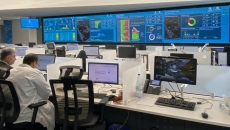Artificial Intelligence
Discussing the value and potential disruption of generative AI for healthcare, the chief medical information officer sees big value ahead from large language models, but says he's taking a cautiously deliberative approach to deploying them.
The study of 1.7 billion clinical notes over a three-year period found an increase in the use of digital tools and copy/paste functionality correlated with longer notes and a decrease in the average time spent writing notes.
The company told the American Diabetes Association that the metabolic monitor could reduce down-the-line healthcare costs for T2 non-insulin users and others. "These trends have to change," says CEO Kevin Sayer.
It expects to get a contract shortly to supply its AI solutions in over 170 hospitals across the kingdom.
According to AWS International Government Health Lead Nicky Murphy, providers can improve their productivity and resilience by migrating to cloud. Cloud platforms also offer native AI and machine learning tools.
The RATE program's algorithm that worked like a "check engine light," getting service members with wearables into treatment faster, has implications for healthcare, says Jeffrey Schneider at the Department of Defense and Navin Natoewal of Philips.
Rachini Ahmadi-Moosavi explains why planning and guardrails are so necessary as artificial intelligence becomes embedded in an array of clinical, financial and operational use cases – and explains how they should best be applied.
The FDA-cleared and CE-marked image analysis software helps providers diagnose and monitor patients with neurological conditions.
Lynne Chou O'Keefe, founder and managing partner of Define Ventures, tells MobiHealthNews what characteristics of a company are essential to garner investment.
A reduction in clinical note taking leads to better outcomes for both patients and physicians facing burnout, says CEO Dr. Anthony Mazzarelli.








